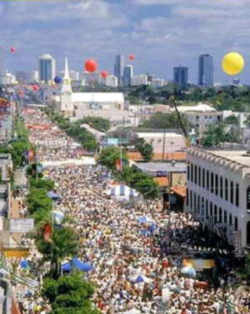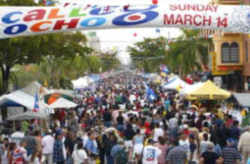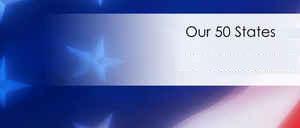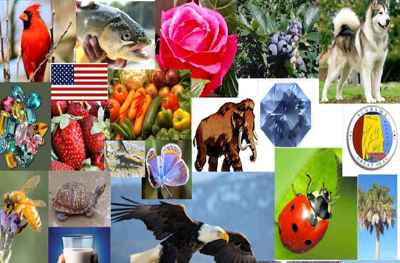
Florida Symbols
Florida State Festival
Calle Ocho Open House 8

Adopted in 1980
In 1980, the Florida legislature identified the Calle Ocho-Open House 8 festival as the official state festival.
The festival "Calle Ocho-Open House 8," a Florida historical festival presented annually by the Kiwanis Club of Little Havana and the Hispanic citizens of Dade County.
Calle Ocho (Spanish for 8th Street) is the single largest celebration of Hispanic culture in the United States. El Festival de la Ocho, as commonly known to many, closes down S.W. 8th Street (the most popular street in Little Havana), from 27th to 4th Avenues to span twenty-three city blocks. It is the world's largest street party filled with musical stages, youth sites, folkloric sites and food vendors.
Florida State Festival: Calle Ocho Open House
Exploring the Culture of Little Havana
A Learning Community Project (School of Education, the College of Arts and Science and Eaton Residential College, University of Miami)
The Birth of the Calle Ocho Festival
by Elizabeth Hackley
 In the heart of Miami, Florida,
the Calle Ocho Festival is an event open to people of all ethnic backgrounds and age groups. This event dates back to the late seventies. The festival
originated in 1977. It was organized by two men, Leslie Pantín Jr. and Willy Bermello, who wanted to start a project with the Miami Herald to bring
the community closer together. They decided on a festival while scribbling on the back of a place mat at lunch one day at the Red Coach Inn during
the summer of 1977. Pantín and Bermello's goal was to have a street party that would display the Latin-American lifestyle in the city of Miami for
non-Spanish speakers. Today, this festival has grown into the largest Hispanic festival held in the United States. Hundreds of thousands of people
attend the event for the dancing, eating, and getting to know everyone and everything that is part of Little Havana.
In the heart of Miami, Florida,
the Calle Ocho Festival is an event open to people of all ethnic backgrounds and age groups. This event dates back to the late seventies. The festival
originated in 1977. It was organized by two men, Leslie Pantín Jr. and Willy Bermello, who wanted to start a project with the Miami Herald to bring
the community closer together. They decided on a festival while scribbling on the back of a place mat at lunch one day at the Red Coach Inn during
the summer of 1977. Pantín and Bermello's goal was to have a street party that would display the Latin-American lifestyle in the city of Miami for
non-Spanish speakers. Today, this festival has grown into the largest Hispanic festival held in the United States. Hundreds of thousands of people
attend the event for the dancing, eating, and getting to know everyone and everything that is part of Little Havana.
The Calle Ocho festival was originally named the Open House Eight, because the two organizers wanted the festival to be an open welcome to southwest
Eighth Street. With no credit, Pantín and Bermello ran into a slight problem with their idea. They needed money to start up their plan for the festival.
Relying solely on the aid of friends for finance, they managed to raise $37,000 to put on a fifteen block street party. However, Pantín and Bermello
still needed coverage for the new festival. Thanks to knocking on many doors, making presentations to advertisers, and receiving television coverage,
they received all the publicity they needed. People from all over South Florida came to attend the Calle Ocho festival. The first festival, held in
1978, was a major success.
Music, food, dancing, and smiling faces are some of the many attractions you may find at this festival. Performers such as Willy Chirino, Oscar de
Leon, El Gran Combo, Celia Cruz, The Barrio Boys, and Gloria Estefan and the Miami Sound Machine, among others, have performed during the past twenty
years. Salsa, merengue, cumbia, and guaguancó dancers fill the streets of Little Havana every year. They come for the dancing, but also for the arepas
and maíces, chorizos and churrascos, mountains of saffron rice, pinchazos, chicharrón, lechón asado, and a gourmet delight called hot dog con bacon.
The streets are also lined with beer stands, telephone tents, and T-shirt vendors.
With the hopes of creating a new Mardi Gras, Pantín and Bermello still organize the yearly event, although they no longer play a major part in its
execution. With South Florida's growing Hispanic population, their Mardi Gras dreams may still come true.
Florida Law
The law designating "Calle Ocho-Open House 8" as the official Florida state festival is found in the Florida Revised Statutes, Title 2, Chapter 15, Section 15.0395
Title IV EXECUTIVE BRANCH
Chapter 15 SECRETARY OF STATE
Section 15.0395
15.0395 Official festival.- The festival "Calle Ocho-Open House 8,"a Florida historical festival presented annually by the Kiwanis Club of
Little Havana and the Hispanic citizens of Miami-Dade County, is hereby recognized as a festival of Florida.
History.- s. 1, ch. 80-82; s. 6, ch. 2008-4.







